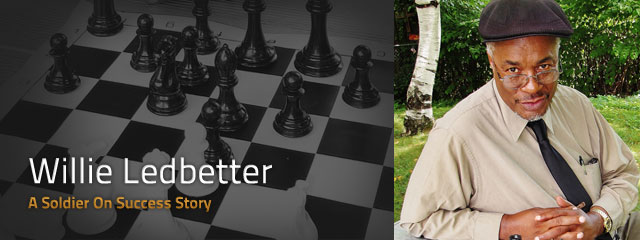Success Story: Willie Ledbetter
Each month Soldier On highlights a formerly homeless veterans success story.
The low point is easy to remember for Willie Ledbetter.
“Sitting in a graveyard in Hartford, injecting with heroin – that was my rock bottom,” Willie recalls. It was the mid-1990s, and the U.S. Army infantry veteran was homeless and strung out. “A tombstone waiting for the exact date of death,” as he puts it.
Fast forward to the present, where a rejuvenated and reborn Willie Ledbetter serves as Outreach Coordinator for Soldier On, visiting prisons, jails, shelters and boarding houses in an effort to bring homeless veterans to a more appropriate place to begin recovery. An ex-convict himself, who served three long jail sentences for drug-related crimes following his military discharge in 1976, he carries substantial street credibility when dealing with troubled homeless veterans.
“Guys relate to me because I’ve been to jail and I’m a product of the streets,” Willie said.
Willie grew up in Hartford, with dreams of becoming an Air Force pilot or astronaut. Instead, he dropped out of 9th grade on the day Martin Luther King was assassinated.
“I realized later that went directly against Dr. King’s teachings,” Willie said. “I dropped out instead of staying in school and furthering my education.”
Willie soon hooked up with the wrong crowd and spent some time in juvenile detention. Recognizing what might lie ahead on the streets, he joined the National Guard in 1972, and two years later enlisted in the Army. He was stationed in Germany, trained as a gunner. It was during this time that he started smoking heroin. He had earlier dabbled with alcohol and marijuana, but after his discharge from the military, his addiction led to street hustles, robbery, drug deals and the three jail terms over the next 19 years. He has a daughter, Robin, but was barely there for the early years of her life. The product of addicted parents, Robin was involved in the murder of a Hartford cab driver when she was 14 and is now 15 years into a 50-year state prison sentence.
In 1995, Willie was on a two-year run of street hustling to support his drug habit, dodging arrest despite committing crimes including larceny and shoplifting. It was then that he hooked up with a counselor who helped place him in a 21-day in-patient substance abuse treatment program at the VA Medical Center in Leeds. When the 21 days were up, he was offered a bed at Soldier On, located on the VA Leeds campus, plus help finding work. He was a materials handler at a local plastics company, worked as a welder and nursing assistant, and kept up with his 12-Step Program. He has been sober since 1995, is a born-again Christian and is unapologetic about his passion for playing chess. The consummate team player at Soldier On, Willie has responded to the agency’s needs by serving in a number of capacities, including general manager.
Soldier On, he said, “granted me an opportunity in life. I was fortunate that I was a veteran. Because of my history, I didn’t believe I’d be given an opportunity like the one Soldier On gave me. Soldier On doesn’t judge your past. They look at your future and your goals and work with you to become a productive member of society again.”
Willie recognizes the role of spirituality in his own turnaround, and emphasizes that element when speaking to fellow veterans.
“It’s not just about going to meetings and getting yourself a sponsor,” Willie said. “You’ve got to get yourself a spiritual foundation. You give it your all to get that drug, so you’ve got to have that same drive to get your faith, and that’s what keeps you sober.”
Now, as a way of giving back to the community, Willie also speaks with at-risk students about his own background, including its terrible effects on his daughter’s life. For Soldier On, he seeks out at-risk veterans in the courts and jails, makes the rounds of homeless shelters, and brings the homeless veterans to Leeds if they are sober and willing.
“He’s a man who believes in redemption. He’s living proof,” a Springfield newspaper columnist once wrote of Willie.
“This program can change your life,” Willie says.




